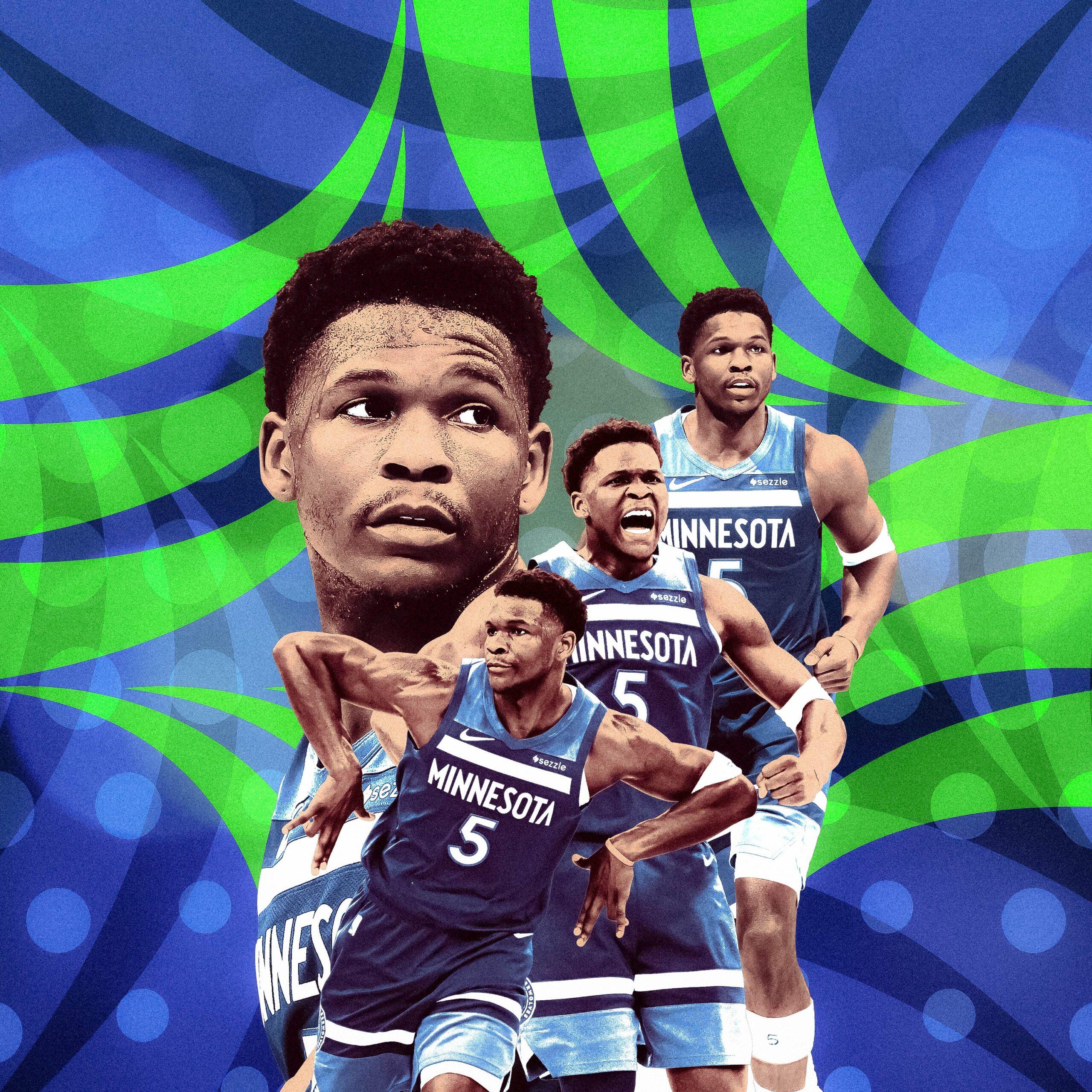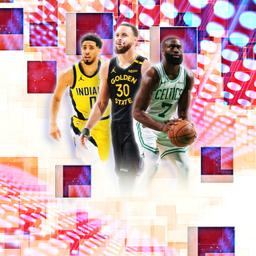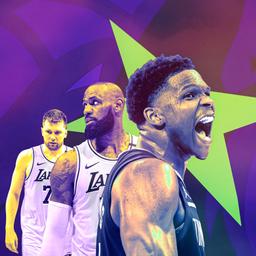
Wunderkinder are rarely born—they’re fashioned in fits and starts. Serendipity and innate ability are crucial to the recipe, but they’re only part of it. Nobody really knows, in advance, their own zenith. Only what they want it to be like.
Basketball prodigies develop on these terms. You watch how they move and think of bygone phantoms doing similar things. This is another way of saying that, on the court, imitation isn’t just the highest form of flattery: It’s the first form of creation. That dynamic has always been a part of the game. The greats are constantly thieving from their forebears. Numbers, jump shots, footwork, brandings. Let Weezy tell it: It ain’t biting. It’s “called recycling.”
In practice, what this means at the highest levels of the game is that you know the real when you see it—even if it ain’t all theirs to begin with.
Anthony Edwards, the Timberwolves’ 23-year-old archetypal shooting guard, is, if not the latest example of this, the most compelling one in recent memory. He makes a certain class of basketball connoisseur regularly hoot, howl, holler. Edwards’s ballhandling recalls that of a mid-aughts crossover king. His footwork, in and out of the paint, belongs on the pitch. The jump shot is silky, interior touch soft as velvet.
Edwards, in his own words, is “the truth”—an observation the Atlanta native expressed directly to former president Barack Obama. He entered the league at 18 years old as a pup with grown paws, exceedingly raw and effortlessly lithe. If he had a bona fide moment of arrival, it came toward the end of his COVID-interrupted rookie season, when Edwards rose up from the left baseline in the third quarter of a home game against Toronto, nearly hit his chin on the backboard, and threw Raptors forward Yuta Watanabe directly into a casket.
By year two, Ant reached an average of 21.3 points per game. By year three, he hit 24.6 and made his first All-Star appearance. Last year, he took out apex offensive predator Nikola Jokic and the defending champion Denver Nuggets, leading the T-Wolves to their second Western Conference finals before losing to Slovenian offensive maven Luka Doncic. In Round 1 of the 2025 playoffs, Edwards avenged that defeat by dispatching Doncic and his new team, the Lakers, in a gentleman’s sweep.
Now he’s looking to shake off a Game 1 flop and topple another withering dynasty in the indefinitely Steph-less Golden State Warriors. If the early action in both conferences is any indication, the path is there, the mantle for the taking. These playoffs aren’t Ant-Man’s chance to step out onto the stage—he’s been performing for us since he was practically a kid—but they are his opening to, for the first time, outright claim it.
There are the parts of Edwards’s image that leap off the screen. His irrepressible charisma—not just telling Obama that he better recognize that Ant is “the truth” but that the rest of “d’boys” on the U.S. Olympic team “know.” How the fifth-year pro is able to take televised showmanship and strip it down to the point where viewers start to wonder whether he’s aware of the camera rolling or simply doesn’t care. The pearly smile and the icy earlobes and the buoyant charm.
The ways in which Edwards talks shit fit into this: screaming “go home” to Warriors fans and barking in Steph’s face. Making KD giggle while howling at him after a pull-up 3. Waving bye-bye to the crowd in Denver after sealing a Game 7 upset. Getting T’d up just for looking at Reggie Jackson. In Ant, we’re talking about the same fool who swears he could go pro in every sport he touches—who has teammates saying things like, “He say he could play tennis,” and, “I’ve heard he can play in the NFL, MLB, and NHL.”
He’s not averse to the kind of public reflection that’s catnip to reporters and modern media consumers alike. He knows how he’s perceived: “I’m smarter than a lot of people think,” Edwards once said with a grin. “I just look like this.” He’s honest about his room for competitive growth: “This is my first time where I’m having my own team,” he told reporters earlier this year, “and I haven't been showing it. I don’t think I’m a superstar yet.” He isn’t afraid to give props to his opponents or cop to not having all the answers on the court.
He blinked as a teen and went from blowing kisses to his momma mid-game at AAU tournaments to burying her to burying her mother too (seven months apart; same disease). Older siblings turned into legal guardians. Once routine school-day commutes became hour-long treks to lily-white suburbs. He stayed in-state for college, balled out, and, on draft night, watched his name flash across the screen, with paintings of his mother and grandmother flanking him. Now he’s a star—whether he wants to be, believes it, or feels ready. There’s no getting from all of that to all of this without realizing that this ain’t shit—and having to know precisely that, as much as anything else, is Edwards’s burden and leg up.
What we’re thumbing around with here are the parts of Ant-Man that he’s worn on his sleeve, that he can’t help but do anything else with. They’re all him: sweet, sour, rough, raw. But his game, what he turns into when a ball hits the hardwood, is an amalgamation of so many different sources, so many different visions, each of them originating beyond him.
Edwards’s physical profile is the most unique thing about how he plays but nonetheless conjures up a whole line of familiars. He’s been getting all those Jordan comps since he burst onto the scene for a reason. The manner in which he so often defies gravity, seems to take off and keep rising just a bit longer and farther than all of his peers, is central to the comparison. So too are his other physical traits: a growth-spurt assisted (and MJ-like) 6-foot-6 height, plus hands that could palm a beach ball, let alone the rock. Edwards’s skills on the court—his tendencies and efficiencies and habits of destruction—have his idols spray-painted all over them. Footwork mastery in line with Kobe and Jordan. The dexterity and flash, on both sides of the ball, of a young Dwyane Wade.
Ant’s most evident imprint on the court is how he opts to go about controlling and manipulating the game. It’s not just that he has a killer crossover in function—it’s how Iversonian it is in form. It’s not just the efficacy of his jumper—it’s how silky smooth it looks. It's not just a go-to Euro-step or spin move under duress—it’s whom those acts evoke in traffic. Even if these moves are born from impersonation, they say something expressly about Edwards, increasingly so as he’s honed them.
Five regular seasons and two playoff runs do not make an athletic prime. Edwards is still capable of emerging from another chrysalis or two before the other side of 30. He went from shooting a paltry 32.9 percent behind the arc as a rookie to converting on 39.5 percent of his chances this season. The significance of this moment in particular is that it marks the point at which he’s mastered so much mimicry—is able to apply each lesson in such varying and functional ways—that every piece of his game has ceased to exist in a vacuum. Edwards’s play is so clearly legible that its roots fade away. The whole becomes something else entirely. He reminds you of himself.
Ant’s ability to dominate all over the court as the stakes continue to rise will be part of formalizing this leap. Nobody wants to hear about how you’ve arrived when you're always on your way. (Nothing built to last wilts under pressure.) Winning, as much as individual production, sets it in stone. Depending on how high you are on his potential, the postseason scramble is either a stumbling block in waiting or the gateway to his final evolution. Even if Edwards makes it back to the conference final, it’ll be easy to downplay the moment retrospectively, so long as he doesn’t leave his imprint all over the court. That, too, is how the game has always been played.
Whether Ant is destined to reach face-of-the-league status is a dicier proposition. Smart money’s on his rough edges obstructing that path. There are a whole lot of folks whose first memory of him was that foul, anti-gay IG post he made as a 21-year-old. His social media scandal in December 2023—reportedly, a woman shared a positive pregnancy test with him, and Edwards told her to “Get a abortion lol” and sent her $100,000—is the type of extracurricular buffoonery that gets Zion and Ja clowned. (After the comments were leaked, he walked them back, saying in a Notes app apology that the texts were sent “in the heat of a moment” and that “all women should be supported and empowered to make their own decisions about their bodies.”) Edwards’s second pregnancy-related scandal—he allegedly texted another paramour to “Get da abortion lol” when informed that she was pregnant too—ain’t exactly Wheaties box material either. Even ignoring what happens off camera, it’s a tall order to maintain one’s status as a Sprite spokesman while also reminding courtside fans that “my dick bigger than yours.” (To say nothing of the $280,000 in fines he’s accumulated in the last year from the league office, or all the technical fouls.)
Granted, that’s never stopped the folks who came before him—there might even be a not-so-infinitesimal degree to which it may have added to their mystique. But those folks were never subjected to this level of hyper-visibility in the post–social media era. Jordan’s alleged gambling debts weren’t totaled on IG live. Wilt’s promiscuity wasn’t subject to screenshots. The open question of Ant’s career will be whether his blemishes can stand up to a 4K livestream as expertly as his game can.
On the court, at his best, he echoes a bygone form of smooth. Five years in, he’s still young enough to have no business being this good. That alone puts him next in a line dating back to cigar-hazed Chicago locker rooms, Hollywood spotlights, and gleaming New England parquet floors. Serendipitous, innately skilled, familiar, and unique, he may not think he’s a superstar, but we know it when we see it.




